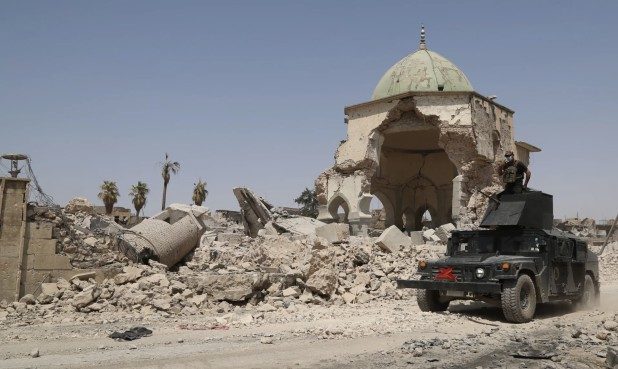The Australian defence force says allegations that an air force bomb in Mosul, Iraq, killed civilians are “credible”.
The Australian Super Hornet airstrike last year is said to have killed two civilian adults and injured two children when it bombed a terrace house in west Mosul.
Amnesty International says the strike “may have violated the rules of war”, and has renewed calls for an independent commission to investigate other potentially unlawful Coalition airstrikes.

Benjamin Walsby, who authored Amnesty’s report on civilian deaths in Mosul, welcomed Australia’s willingness to investigate the deaths and called on its Coalition partners to follow suit.
“At the time and to this day, we call on Coalition members to investigate all incidents of strikes that may have violated the rules of war, and this is one of them,” Walsby said.
“Even if we were unable to corroborate that it violated [international humanitarian law], it nonetheless fits within the wider pattern that we documented of unlawful strikes carried out during the Mosul operation.”
On Wednesday, Australia’s deputy chief of joint operations, Maj Gen Greg Bilton, held a briefing on the deaths and confirmed the allegations were credible.
Bilton spoke shortly before the US-led Coalition released its own monthly civilian death report, which included details on the Australian air strike. Bilton said it was possible the people involved were a family Isis was using as human shields.
Mosul, the Iraqi capital of the so-called Islamic State caliphate, fell in July after a nine-month campaign.
The Coalition’s monthly civilian deaths report, said 855 civilians have been unintentionally killed by Coalition strikes since the start of Operation Inherent Resolve, the mission to defeat Isis in Iraq and Syria.
Another 522 reports of civilian deaths are still open.
The airstrike involving Australian forces occurred on 3 May, but it wasn’t until a non-government group, Airwars, raised the matter in late August that the US-led coalition fighting Isis in Iraq and Syria conducted an investigation.
At the time of the incident, Australian and coalition aircraft were supporting Iraqi security forces carrying out clearance operations on the ground.
They were coming under fire from two Isis snipers located in the second storey of a house and the Australian airstrike happened within minutes.
Bilton insisted a thorough assessment was conducted to confirm it was a valid target.
An unmanned drone was also flying overhead providing “situational awareness” in and around the target, providing three minutes of footage of the location before the strike and several minutes of footage from the Australian aircraft, but it won’t be publicly released because of operational security.
The Australian jet dropped a single weapon – a GPS guided bomb with a delay fuse – collapsing the second storey.
No civilian casualties were identified during the post-strike review, Bilton said.
Amnesty International had a witness account of the incident. It could not corroborate the account, but passed it on to Airwars, a group monitoring airstrikes and civilian deaths in the Middle East. Airwars investigated and found enough evidence to include the incident in a broader report on civilian deaths to the US-led Coalition.
The Amnesty International witness was not interviewed as part of any subsequent coalition or Australian investigations.
The Australian defence force was informed about the possible civilian casualty incident in February and launched its own investigation to ensure the law of armed conflict and rules of engagement had been complied with, and to ascertain whether procedures needed to change.
“There are no specific lessons we have learned from this strike that we can apply to improve our processes,” Bilton said.
Asked if defence was investigating other possible civilian casualties, Bilton said he couldn’t definitively say there would not be more investigations.
“There’s none in the pipeline, we haven’t been advised [by the coalition] they’re doing further investigations with regards to Australian strikes,” he said.
Australia’s six Super Hornets returned to Queensland in January after flying their last missions after more than three years of operations.
Source Article from http://www.hangthebankers.com/australian-military-kills-more-civilians-iraq/
Related posts:
Views: 0
 RSS Feed
RSS Feed

















 April 1st, 2018
April 1st, 2018  Awake Goy
Awake Goy  Posted in
Posted in  Tags:
Tags: 
















